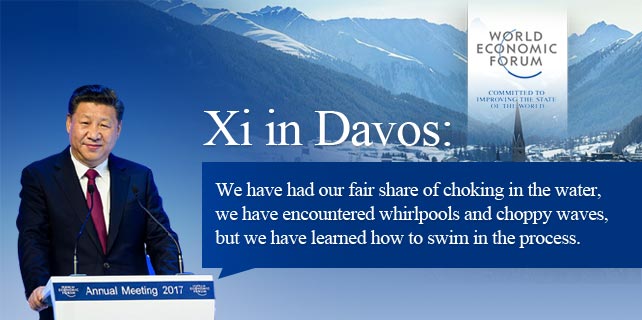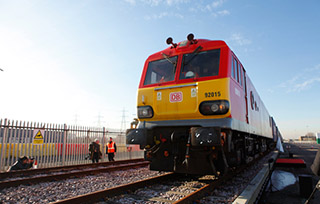Just what Europe wanted to hear
Since Jan 17 media attention has been monopolized by the annual World Economic Forum, which brings together leaders in politics, business, economics, technology and society. This year the main topic discussed was how to promote responsible and responsive leadership.
As shown by recent voting, the gap between political leaders and civil society has never been as important as it is today. Digital media are providing key instruments for reducing the gap. Politicians and business leaders have embraced Twitter in order to stay in touch with their constituents, turning them into followers.
But Twitter is only the tip of an iceberg. Social media, connected devices and big data will provide a better match between the expectations of voters and customers on one side and those of political and business leaders on the other.
A few weeks ago, the Las Vegas' Consumer Electronics Show (CES) once again offered a showcase for new digital opportunities in this area.
Leading telecom vendor ZTE presented its new 'Hawkeye' smartphone, which resulted from its innovative crowdsourcing project to develop a phone based on consumer choices. Last year, ZTE started collecting ideas from the Android community about the future smartphone they would like to see on the market. Future users chose from phones with five core features, such as eye-tracking, self-adhesive back, waterproof VR mask functions, and the ZTE is now in mass production thanks to the success of crowd-sourcing.
Empowerment of the consumer is the future.
In the same vein, WeChat, the messaging service of Chinese tech giant Tencent, is taking a big step to liberate smartphone users from the need to compare and download apps from Google Play or the App Store. The main features normally obtained via apps are now available inside the messaging service via so-called mini-programs, allowing users to make payments, book a taxi, order food, book tickets, etc. The days of apps may be numbered.
It isn't just luck that these major innovations came from China. A total of 1,575 Chinese companies exhibited in Las Vegas, one third of the total number of exhibitors, second only to the US.
These numbers illustrate the increased contributions of China to the global economy, not only in terms of innovation but also as an engine of economic growth. Today, China is progressively translating this economic power into political influence. This was highlighted by media coverage of the keynote speech given by President Xi Jinping on Jan 17, due not only to the fact that it was the first appearance of a Chinese head of state at Davos, but mainly because of his clear messages.
In his strong defense of globalization, President Xi claimed that the only way to ensure growth and productivity is to work hand-in-hand to improve global governance and make it more inclusive. The president confirmed his country's firm commitment to pursuing an enabling environment for foreign investments, boosting domestic consumption, developing advanced manufacturing and striving to maintain the positive momentum of the Chinese economy, which has contributed as much as 30 percent to annual global growth since the financial crisis.
Xi's message will have been music to the ears of the large delegation from the EU - 12 commissioners out of 28 - in Davos. With the French and German elections in sight, a major challenge for the Eurozone is to deliver growth. Forecasts see growth in the Eurozone slowing slightly in 2017, after coming in at an expected 1.6 percent in 2016. Forecasts for 2018 are not much better: GDP growth is predicted to stagnate at 1.5 percent in 2018.
At the same time, the Chinese economy is expected to grow at 6.5 percent in 2017. EU leaders are looking east, particularly now that the incoming Trump administration is bringing substantial uncertainties about future EU-US and US-China trade relations.
The EU has much to offer China.
First, there is a stable and predictable trade policy framework determined by the EU Commission under the active leadership of Trade Commissioner Cecilia Malmstrom, who attended the Davos Forum, explaining the opportunities offered by the EU's trade policy to the top Chinese business leaders who were present. These included Alibaba's Chairman Jack Ma, China Telecom's Chairman Yang Jie, Baidu's Chairman Zhang Yaqin and HTC's Chairwoman Cher Wang.
Second, there are lucrative investment opportunities. Think of the recent acquisition of German robotics maker Kuka by China's Midea. The EU's innovative companies allow China to fill technology gaps and strengthen its emerging global digital leadership.
On the initiative of Jyrki Katainen, European Commission vice-president for jobs, growth, investment and competitiveness, the EU has launched a practical operational website allowing any company in the world to find investment projects in the EU, including its digital sector - the European Investment Project Portal - with, for the moment, a list of 139 promising projects.
President Xi made clear that isolationism is not part of his country's policy. Let us now work together to implement this policy, bring together Chinese and EU business and start building together our common future.
The author is director of ChinaEU, a business-led association in Brussels. The views do not necessarily reflect those of China Daily.
(China Daily European Weekly 01/20/2017 page7)


















